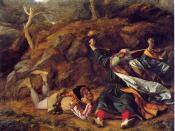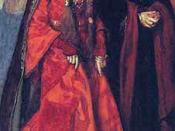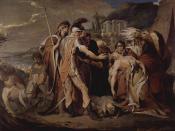At the heart of King Lear lies the relationship between father and child. Central to this filial theme is the conflict between man's law and nature's law. Natural law is synonymous with the moral authority usually associated with divine justice. Those who adhere to the tenets of natural law are those characters in the text who act instinctively for the common good--Kent, Albany, Edgar, and Cordelia.
Eventually, Gloucester and Lear learn the importance of natural law when they recognize that they have violated these basic tenets, with both finally turning to nature to find answers for why their children have betrayed them. Their counterparts, Edmund, Goneril, Regan, and Cornwall, represent the evil that functions in violation of natural law. All four conspirators are without conscience and lack recognition of higher moral authority, since they never consider divine justice as they plot their evil. Their law is man-made, and it focuses on the individual, not the good of the community.
Tragedy unfolds as two carefully interwoven and parallel stories explore the abandonment of natural order and the unnatural betrayal of parent and child.
In the primary plot, Lear betrays his youngest daughter and is betrayed by his two oldest daughters. In almost identical fashion, the subplot reveals another father, Gloucester, who betrays his older legitimate son and who is betrayed by his younger illegitimate son. In both cases, the natural filial relationship between father and children is destroyed through a lack of awareness, a renunciation of basic fairness and natural order, and hasty judgment based on emotions. By the play's end, the abandonment of natural order leaves the stage littered with the dead bodies of fathers and their children.
In the opening act, Lear creates a love test to justify giving Cordelia a larger share of his kingdom. Although...



Super
You should read this one it has a very good point of view but could have went in to more detail.
0 out of 0 people found this comment useful.